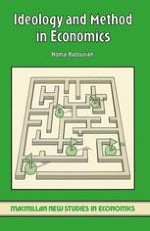1980 | OriginalPaper | Buchkapitel
Economic Theory and Mathematical Economics: Abstraction and Generalisation in Economic Science
verfasst von : Homa Katouzian
Erschienen in: Ideology and Method in Economics
Verlag: Macmillan Education UK
Enthalten in: Professional Book Archive
Aktivieren Sie unsere intelligente Suche, um passende Fachinhalte oder Patente zu finden.
Wählen Sie Textabschnitte aus um mit Künstlicher Intelligenz passenden Patente zu finden. powered by
Markieren Sie Textabschnitte, um KI-gestützt weitere passende Inhalte zu finden. powered by
Any body of scientific knowledge must contain a hard core of fundamental theories. These theories — at least in the first instance — must be products of the process of isolation, abstraction and generalisation. That is, they must be based on simple — and general — hypothetical models of the world of reality which may turn out to be more or less true in their application to concrete, complex — and specific — situations. A scientific theory cannot be the result of a generalisation from ‘direct’ observation: there is no such thing as ‘direct observation’; all observations presuppose hypotheses; empirical generalisations (or ‘laws’) can at best describe, not explain, the phenomena, because, by definition, they cannot establish casual relationships; they are, therefore, of little predictive value because they describe what has been ‘observed’, not what will be. This is true both of direct generalisations from contemporary, and from past ‘observations’; both of empiricism and of historicism. Yet historicism has at least one advantage over empiricism: it cannot claim to be based on ‘direct observation’, and therefore it is more obviously impregnated with interpretive valuations.
